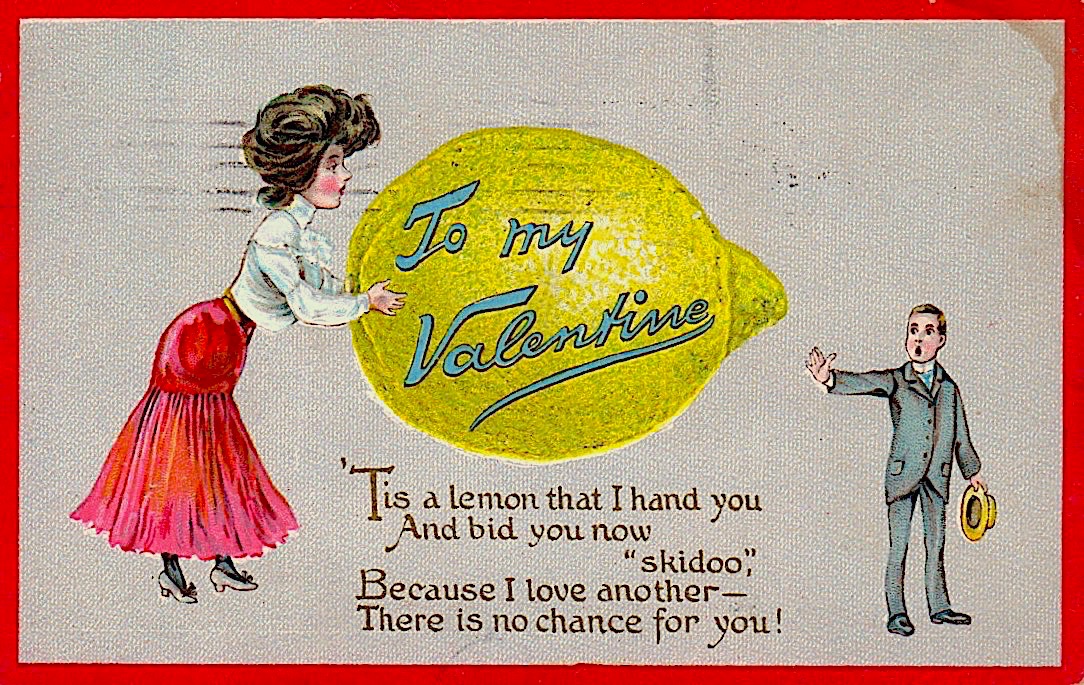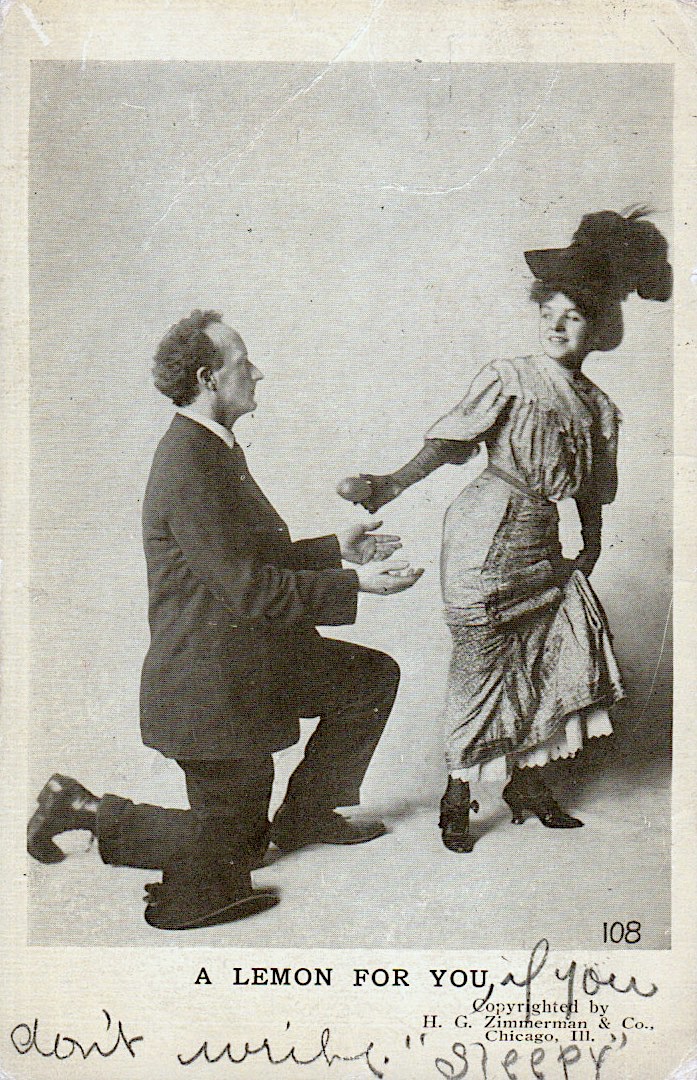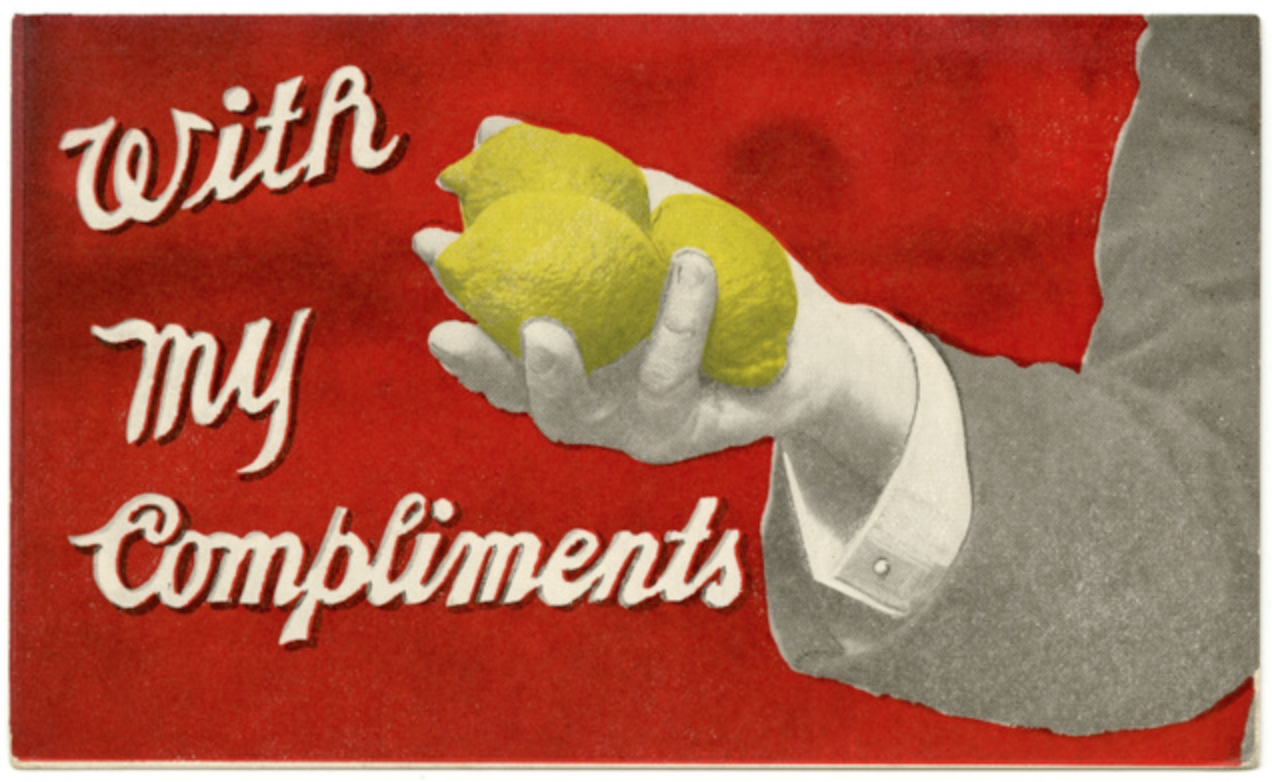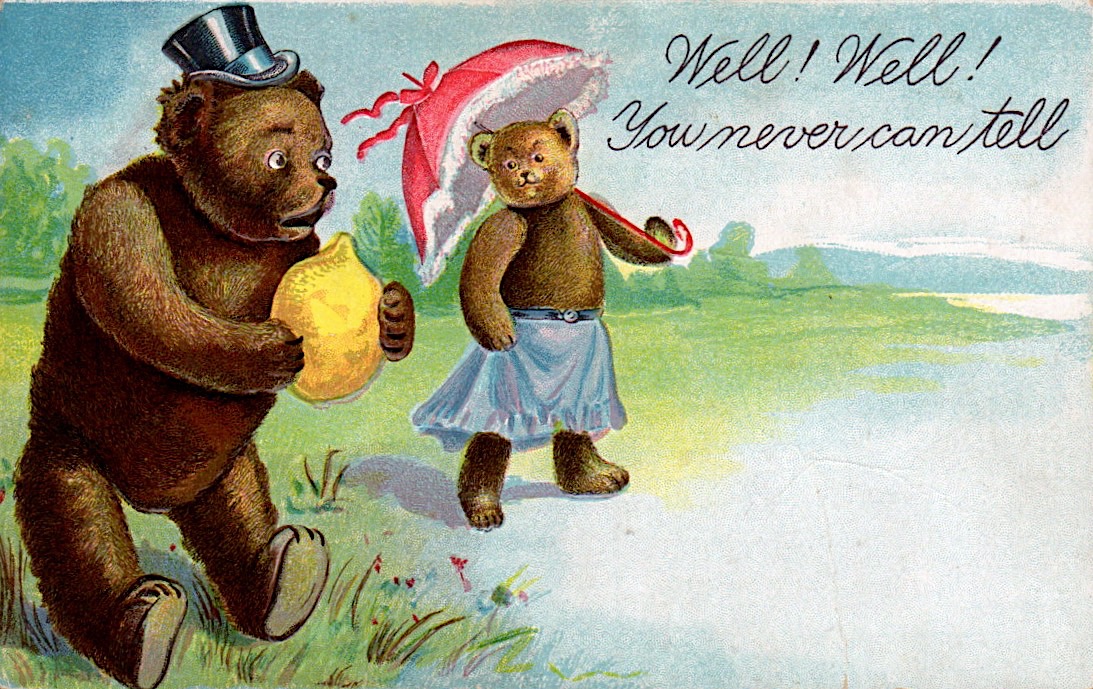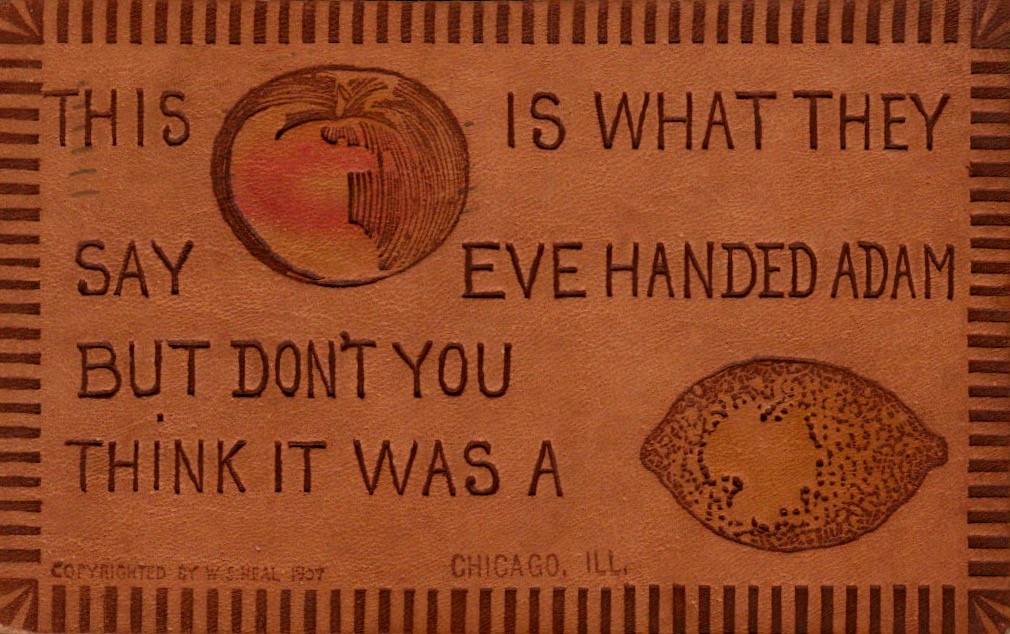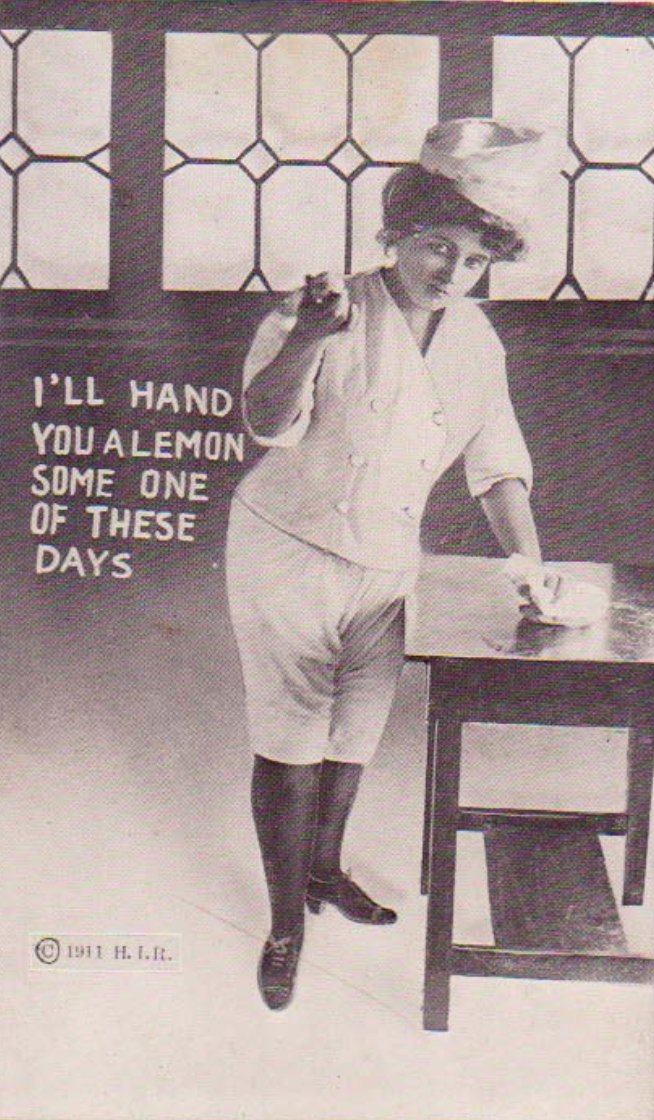This Valentines Day, we bring you a bit of turn-of-the-century breakup slang.
Back when my husband was my boyfriend, he mentioned an antique postcard that hed picked up and mailed to his parents. On it, a mans outreached hands held yellow and green oviform fruits; the type read A Lemon and a Lime With My Compliments. Andy didnt quite understand the card, he told me, but it had amused him, and he wondered what had become of it.
That was early in our relationship. I was eager to be lovable. Shopping eBay for another copy for him, I scored two, both showing a crateful of citrus. This Box of Oranges, with my Compliments, from Florida, went one; This Box of Grape-Fruit With My Compliments From Florida, went the other. Im from Florida, so the postcards were on-target, and next visit home I sent them out to desired effect. Vitamin C protects the body against scurvythat was the meaning in my mind. You offered lemons to people you approved of to keep them prime.
Neither of us yet knew the true meaning behind the phrase handed a lemon.
Recently, I bought Andy a manual citrus press, and went back online to find a vintage postcard to accompany the present. Thats where it all began.
There was a black-and-white photograph from 1908, in which a lady dropped the fruit into the palms of a gentleman down on bended knee: A LEMON FOR YOU. Another, from the same era, shows a teddy bear in a top hat clutching a lemona look of shock on his mugwhile a teddy bear in a skirt made her exit under a parasol: Well! Well! You never can tell. A card made of leather (yes) suggested This  is what they say Eve handed Adam. But dont you think it was a
is what they say Eve handed Adam. But dont you think it was a  ? I saved them, and kept sussing.
? I saved them, and kept sussing.
There was To my Valentine spelled out on a huge lemon; a pretty, pink-cheeked brunette torpedoing a blonde man in a pinstripe suit and ascot:
Tis a lemon that I hand you
And bid you now skidoo,
Because I love another
There is no chance for you
One card just had a bright lemon embossed on the front. It was addressed to Iowa, and somebody had simply penned Ha! ha! ha!
Yikes, I thought, as it dawned on me that Id accidentally given Andyand hed accidentally given his parentssome kind of antiquated fuck you. I turned to newspaper archives to track down the origins of this citrusy slur.
The earliest trace I found was in a humor column in a paper owned by Joseph Pulitzer, from 1905: Do you think that J. Pierpont Morgan ever said whats the use when he thought somebody had handed him a lemon? The origins of the slang were a blur, but New Yorkers claimed it as New Yorkese. The language seems to have bobbed up just as the city was honing its reputation as a place where peoples fortune could be made or broken in a day. In such a place, you were liable to be handed the lemon. The stage, race track, [football] grid-iron, [baseball] diamond, and club room all have stories of their own, a daily reported, describing scenarios where what you got was not what you expected. Or what you wanted. Or deserved. (Or felt you deserved.) The lemon is sour, a clip from that time reads. To sour anything needs no explanation. It is the opposite of sweet.
Henry James apparently said he could derive no meaning from the expression to hand someone a lemon, and the press set itself on him. At any rate, [the phrase] possesses the advantage of terseness over equally meaningless expressions used by Mr. James, one journalist spat. Lemons? another hissed. Why, Mr. James himself has handed lemons to a patient public, lo!, these twenty years.
I asked Greg Zacharias, the director of the Center for Henry James Studies at Creighton University, for some context. For a long time, he told me, probably beginning in the 1870s or certainly the 1880s, James was regarded as an unnecessarily difficult writer. James lived abroad, in England and France, much of his life. In 190405, he returned to America for a tour and a series of lectures, after which he returned to England and published The American Scene, a travelogue of his adventures and a theory of the country he had left behind. When the item about him hating on handed a lemon appeared in November 1906, Harpers Bazaar had just run the first part of Jamess essay The Speech of American Women. That piece was like click-bait, Zacharias said. James blasted what he described as the crudity of the young women. He criticized their pronunciation, and their use of colloquialisms, Zacharias added. To many, the lemon episode confirmed Henry James as totally out of touch.
By 1907, the Boston Herald was quoting a fruit dealer who complained that the language handed a lemon was hurting the lemon trade. To try and belittle the very best friend we have in the line of fruit is unjust, someone agreed. If you had to publicize disappointment with produce, he went on, why not an overripe cucumber or a frozen tomato? How could a lemon tender anything but a compliment?
There are little lemons and big lemons, old ones, fresh ones, shriveled and rusty onesall being handed to somebody all the time, reads one article from the period. Lemons from that period included a variety called the Carnegie, a clear reference to the philanthropists book-less libraries. But it was still unclear to me just how this meaning of lemon had originated.
When I called the lexicographer-linguist Grant Barrett, who cohosts the public radio program A Way with Words and specializes in slang, he immediately pulled up Oxford English Dictionary. Im getting really wonky really fast here, he admitted. But theres a cutoff when youre looking at dictionaries, because once periodicals started becoming digitized in the late eighties, the ability to do historical work exploded. People like meand theres a bunch of usknow that if your entry hasnt been updated since the late nineties or early 2000s, therere probably earlier uses out there.
The main core of lemons definition included 1.c.slang (originally U.S.). Something which is bad or undesirable or which fails to meet ones expectations.and 1.d.to hand (someone) a lemon: to pass off a sub-standard article as good; to swindle (a person); to do (someone) down. Looking at those entries, Barrett pointed out that the first citations were from 1909 and 1906, respectively; and the last ones were from 1970 and 1972. The entries hadnt been adapted in half a century. OED probably hasnt done enough work on lemon since then, Barrett said, leaving it there.
Actually, Oxfords 1.b. entry cites an earlier slang use of lemon: A person with a tart or snappy disposition (quot. 1863). More usually (slang), a simpleton, a loser; a person easily deluded or taken advantage of []. But Barrett was not having it: The problem, he said, is the gap between that date and the next date is really long. Greens Dictionary [of Slang] also has that gap: 1863 to 1909. That gap is a real problem, Barrett stressed. I dont like that gap. Greens also had an entry with a citation from the early nineteenth century, but for very good reasons (which were complicated, and involved Googles metadata), Barrett brushed that one aside as well. The origins of slang are incredibly hard to nail down. The frustrating thing about the digitization of newspapers, Barrett said, is that new stuff is made available all the time, so you cant rely on your work to stay current. And we forget the role newspapers had in spreading slang. It didnt take email and social medianewspapers got things around the country. Sometimes it wasnt the papers, it was the bar all the reporters hung out at. They palled around. They were frenemiesthey stole from each other. It wasnt unknown for them to write each others stories while they were drunk!
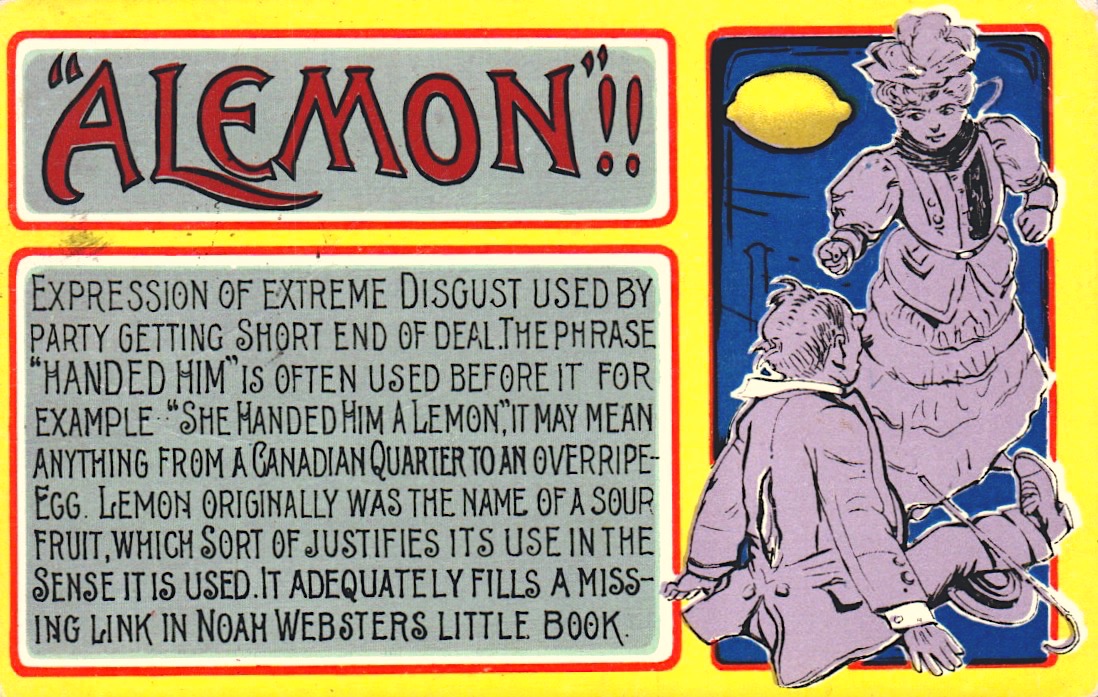
Posted in 1912 by the secretary of the North Valley Literary Society to inform its members that a tax of 25 cents had been imposed on each of them.
On occasion, old slang reenters contemporary popular culture. Barrett gave the example of ginger to mean redhead, which has been used since the 1820s by the British, but not by Americans until South Park, and then Harry Potter, introduced them to it. Another instance was Val Kilmer in Tombstone saying, Im your huckleberry. Simply put, he was the man for the mission. The 1993 movie line made lingo most only knew from Mark Twain go viral, an upshot no one anticipated because slang is so spontaneous. Forcing slang almost assuredly results in a nonstarter. (Consider Gretchen trying to make fetch happen in Mean Girls.) Likewise, attempts to consolidate meaning tend to go nowhere; or rather, the meaning runs in multiple directions. Often, slang never really settles out, Barrett explained. In fact, Huckleberry also referred to an insignificant or worthless person, and how Twain intended it for Finn is subject to debate.
In a forum online, Id seen an exchange come up from Shakespeares play Loves Labours Lost where one character suggests a lemon had been gifted to another character instead of precious nutmeg. Could the meaning we attach to lemons have roots, like so much else, in the bard? I asked Barrett. Again, gaps are suspicious, he told me. Shakespeare has been studied for hundreds of yearswhy would it take so long to happen? Almost all of the expressions we know from Shakespeare show continuous use. Its very rare for Shakespeare to contribute something freshly into the language.
Barrett eventually sleuthed out a song titled A Lemon in the Garden of Love, by the Broadway composer Richard Carle. (A million peaches round me / Yet I would like to know / Why I picked a lemon in the garden of love / Where they say only peaches grow.) He believed this to be the popularizer, the word historians use for the source that renders a phrase recognizable to the general public.The songs mentioned a lot in 1906, 1907, Barrett said, and thats when we see this term [handed a lemon] really take off.
Handing a lemon to someone fell into disuse, but it still haunts the proverb When life gives you lemons, make lemonade. For the most part, well never exactly where a slang phrase started, or why it stayed with us, or why it died out, or when it might come back around. In that way, its just like love. Barrett cautioned against being overly distracted by first uses and key popularizers. You can see the culture move most clearly through bursts of activitylike the postcards.
I have filed them under How To Leave Your Lover With Lemons. As soon as the phrase got out in the world, handed a lemon was applied as rejection and breakup parlance. Theres little as untoward as bad romance. Its striking how meme-like these are, Barrett said, studying the postcards. Theyre all women handing lemons to men? Indeed they were: turn-of-the-century Juliets jilting would-be Romeos, a rebalancing of the gender power differential. They seem ready for use again, Barrett said, and I giggled. I was thinking of the stash of postcards I planned to send my dear, unsuspecting husband.
Chantel Tattoli is a freelance journalist. Shes contributed totheNew York Times Magazine,VanityFair.com, theLos Angeles Review of Books, andOrionandis at work on a cultural biography of Copenhagens statue of the Little Mermaid.

